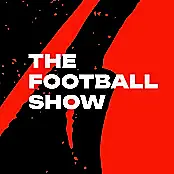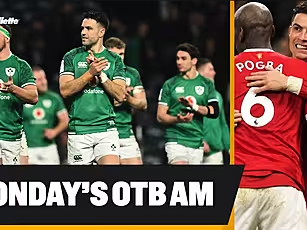Whenever two sides come together to negotiate, one side is going to have an advantage. When the NFL and the NFLPA come together to negotiate, the NFL always has the advantage.
The two sides just agreed on a new Collective Bargaining Agreement that will run until 2030. It needed a majority vote from players to pass.
1,019 players voted for it, 959 voted against. That marginal majority was enough to ratify the new agreement.
The most notable change for the upcoming season is the new playoff format. No longer will two teams in each conference get a bye in the first round, which means this year's Super Bowl-winning Chiefs would have played in the Wildcard Round. Instead, only the top seed in each conference will get a bye and there will be an extra playoff spot in each conference. The NFL gets two more primetime games to sell to television networks.
At some point before 2025, the league will also add a 17th game to the regular season.
Adding another game to the regular season was the biggest reason for the last lockout in 2011. The two sides didn't agree to a deal until weeks before the start of the regular season when the NFL caved to players demands on the eve of the season beginning. The regular season wasn't disrupted, but the start of the preseason was and the offseason was a complete mess. Players gave voice to the contentious nature of the relationship between the two sides at the time.
Now nine years later, not only did the league and the players agree to a CBA quickly, they did so with a year to spare. There was no threat to the 2020 season, the current CBA would have run out ahead of the 2021 season. And somehow, the NFL got everything it wanted without giving up much.
The 17th regular-season game is a huge victory for the NFL because it gives them another week of televised football to sell. Preseason games don't register commercially so swapping out one week of preseason for the regular season maximizes financial reward. Previously, the players heavily opposed an additional game.
The NFL's season is very short. Comparatively, Major League Baseball teams play 162 games in their regular season, the NBA and NHL both play 82. Each champion in those sports is likely to play more games in the playoffs than NFL teams do in total. But surpassed the surface numbers, it's really unfair to frame the NFL's season against its peers.
NFL players exist in an environment of brutality. The injury rate and the severity of injuries are such that the healthiest team at the end of the season is often the best team at the end of the season. Players need a seven-month offseason to maintain their bodies. Adding a 17th game comes at a huge cost physically to all players involved. It significantly increases the likelihood of each player's career ending prematurely on a single play and will curtail careers as a whole by adding more wear and tear to each season played.
So how did this deal pass?
The concessions made by the NFL were designed to appeal to the lower class of the league. Since the last CBA, the middle class of NFL player has been squeezed out. More than half the league is now on a low-end or minimum deal while quarterbacks and big-name players get more and more money. The NFL's strategy was to target that group. The players now get 48% of league revenue, up one percent from the last CBA. That's still the least amongst the four big US sports.
With that extra one percent, minimum salaries will rise to $610,000 per year. That's 20% more than before. Each roster will now carry two more players, that's 64 extra people earning a living. The average career in the NFL is less than three years so these players don't care about the long-term impact of playing a 17th game each season.
All of this sounds very good. The very rich players such as Aaron Rodgers, Russell Wilson and J.J. Watt who spoke out against the deal will still be very rich, those who aren't mega-rich will get more money.
Except for one major issue. The league still doesn't have guaranteed contracts. Giving up a 17th regular-season game should have at the very least come with guaranteed contracts. The NFL is the only sport where players salaries aren't guaranteed and they're the most likely to have their careers ended prematurely. Sam Acho, a member of the NFLPA Executive Committee and supporter of this deal, misrepresented this to his fellow players.
Acho said, "65% of players in the NFL last year made minimum salaries, so when you talk about a 20% increase effectively year-over-year for one extra game, that's a really good deal." That sentence works fine in the abstract. But players who make minimum salaries don't stay in the league year-over-year. Players are more likely to see 10 or fewer game cheques than 10 seasons on an NFL roster.
Acho continued, "These are the types of players who get excited about a fourth preseason game because that's another chance for them to show the coaches and the team their value." This is a complete contradiction of what he's trying to sell. Adding another regular-season game takes away a preseason game and comes with further limitations on offseason practice times. Players on the fringes of rosters will have fewer opportunities to actually make the league now despite the extra spaces on the roster.
Guaranteed contracts would have helped players at the bottom of the league far more than these concessions the league made. The highest-paid players in the league will suffer from this CBA and so will the lower-paid players. The only real victors here are the NFL. They essentially slackened suspensions for drugs and gave up .03 percent of revenue each to earn millions of more dollars.
The NFLPA has a long history of being ineffective. But this is one of the worst cases in recent memory. The players gave up their greatest leverage for minimal return.
It's not an easy position they are in. The NFL has advantages because its functionally only made up of 32 people. Those 32 people all have the exact same goal and each of them are billionaires so they don't need to worry about paying their mortgage next week or putting food on the table for their families. Some players have those concerns. All players have already played college football for free for at least three years after high school. They're already behind on their earning potential so it's understandable that they can be desperate for short-term money.
Furthermore, properly educating over 2,000 people on the intricacies of a large legal document and its ramifications is much more difficult than laying it out for 32 individual businessmen who have teams of the best lawyers doing their work for them.
And the worst part of it all is that an extra round of regular-season games isn't necessarily what fans want. Last season there was no drama in Week 17. The end of the regular season was just a delay process before the playoffs. Fantasy football doesn't run that late into the year and most of the league's fanbases have checked out because their teams aren't playoff-bound. Fans will get more football but it will be more players who don't necessarily belong playing at that level and the quality of playoff games will likely drop by diluting the product down.
14 of 32 teams will now be in the playoffs. The NFL is trying to move toward the NBA model where the regular season doesn't really matter, but the NBA can survive like that because it has marketable superstars all over the league. NFL players don't get that kind of exposure because they wear helmets and the league's culture squashes individualism.
This is a bad day for the sport, a bad day for the players and a bad day for fans. The impact won't be felt anytime soon but it's another reason for the most talented young Americans to look toward basketball or baseball as a future career over football. Colin Kaepernick's blackballing and everything that comes with it has hurt the NFL's popularity. The threat of CTE, the growing physical punishment and the diminishing financial reward for participants makes you wonder what the appeal of playing will be in 10 years.
Download the brand new GoLoud App in the Play Store & App Store right now! We've got you covered!
Subscribe to OffTheBall's YouTube channel for more videos, like us on Facebook or follow us on Twitter for the latest sporting news and content.








